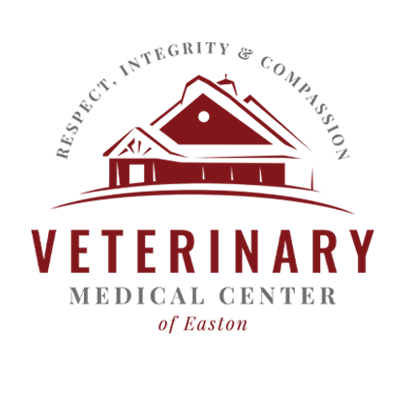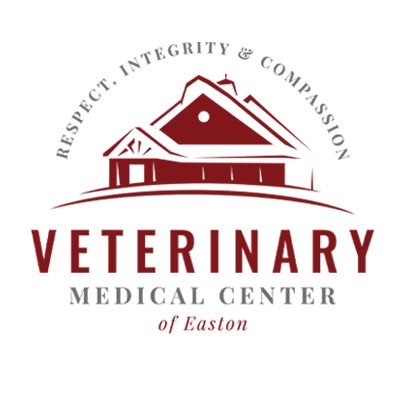At Veterinary Medical Center of Easton,
we recommend seeing your pet
for an oral exam at least
ONCE A YEAR.
Pet dental care is easy to take for granted, which is why so many dogs and cats (roughly 80% and 70%, respectively) show signs of dental disease by age 3!
Oral exams are especially important if teeth brushing is not a part of your pet’s daily or weekly routine. Plaque accumulates quickly and can cause bad breath, painful gums, and bacterial infection in the mouth. With routine exams and Oral ATP’s (assessment, treatment and prevention) in Easton, MD, your pet can enjoy fresh breath, a cleaner mouth, and a healthier life.
Signs Your Pet May Have Dental Disease
Bad breath
Gums that appear bright red and inflamed
Broken, loose, or missing teeth
Yellow/brown discoloration on the teeth
Abnormal drooling
Difficulty chewing while eating
Eating less
Swelling or bleeding of the mouth

Commonly Asked Questions
About Pet Teeth Cleaning
We are more than happy to dispel any uncertainties you have about pet dental care so you can help your dog or cat enjoy better oral health. See our answers to commonly asked dental care questions below!
What does a pet teeth cleaning entail?
We recommend a preventative dental care routine that includes professional dental cleaning by our team. Our cleaning process includes an examination of each of your pet’s individual teeth. We check for mobility, fractures, and malocclusion. We use a modern and safe ultrasonic cleaner to clean each tooth thoroughly – above and below the gum line. Dental technicians polish the teeth to create a smooth, lustrous surface more resistant to plaque buildup. Fluoride treatments help strengthen enamel and reduce tooth sensitivity.
What dental services do we provide?
- Oral/dental exams
- Full mouth radiographs on every patient
- Comprehensive cat and dog teeth cleanings, polishing, and fluoride treatments.
- Minor oral surgery including, but not limited to, tooth extractions, fistula repairs, and removal of oral tumors
- Comprehensive pain management before, during, and after any oral procedure that may cause discomfort
- Monitored general anesthesia through our knowledgeable, well-trained technicians with the aid of digital monitoring of vital signs
- Home dental care instructions
Why are dental X-rays important?
Dental radiography, or dental X-rays, plays a vital role in evaluating your pet’s oral health and formulating an appropriate treatment strategy. Since half of a tooth’s structure is hidden beneath the gum line and invisible to the naked eye, X-rays are the only way to fully assess each tooth’s condition.
Our practice advises doing comprehensive dental X-rays for all pets during each dental procedure, mirroring the standard care you receive at your own dentist. These X-rays are crucial for revealing conditions that may otherwise go unnoticed, such as root abscesses, fractures, significant bone deterioration in the jaw, or cysts. Addressing these issues early during the procedure is essential. Given that pets often endure discomfort without showing signs and cannot express their pain, dental X-rays are critical for ensuring their oral health is properly managed.
How can I keep my pet’s mouth clean at home?
For dogs AND cats, regular at-home brushing is an important part of a preventative dental program. Brushing your pet’s teeth every day will reduce or eliminate plaque buildup. Our staff will show you how to brush your pet’s teeth at home. Brushing your pet’s teeth at the same time each day with pet toothpaste (do not use human toothpaste) and a brushing device (toothbrush, finger brush, gauze on your finger, etc.) is the most effective means of removing plaque from your pet’s teeth. If you have any questions about how to brush your pet’s teeth, our team will be happy to help!
Please call us to schedule an appointment with one of our veterinarians if your dog or cat is exhibiting any of these signs of dental disease:
- Loss of appetite or loss of weight
- Bad breath
- Loose teeth or teeth that are discolored or covered in tartar
- Your pet shies away from you when you touch the mouth area
- Drooling or dropping food from the mouth
- Bleeding from the mouth
Is my pet in pain?
Our pets’ instinct to hide their discomfort can make detecting pain difficult. Dogs and cats frequently disguise their discomfort, which could result in their underlying oral problems being overlooked. Therefore, it isn’t uncommon for pets to continue eating as normal, even in the presence of oral issues including pain, swelling, and tartar buildup. Subtle signs that your pet may be experiencing pain include more frequent licking, shifts in breathing patterns, variations in their stance or movement, and alterations in sleeping routines. When in doubt, contact us!



